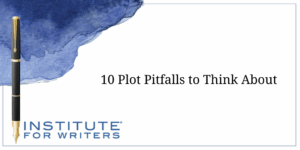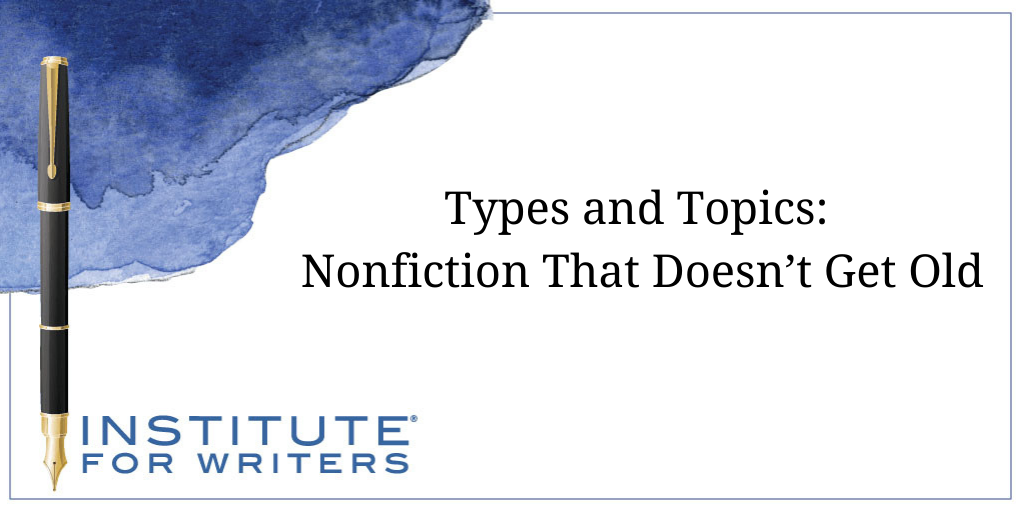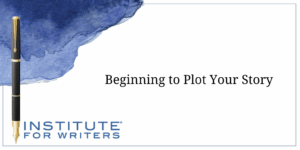
10 Plot Pitfalls to Think About
Plot can be tricky, and, as a writer, you need to be aware of what makes or breaks plot. Take a look at 10 different things to avoid in your own writing.

We teach our students how to write and get published!
View our Course Catalog >
Can everything “old” become “new” again when it comes to nonfiction writing? Yes and no. Certain categories of nonfiction remain ever popular, and many topics appear year after year—but with new details, fresh slants, and updates that reflect changing times.
A look at magazines published one, five, ten, and twenty or more years ago will reveal the same categories of nonfiction and many of the same topics. Why? Because they address universal needs and aim to help readers improve their lives.
What categories of nonfiction do you like to read and/or write? In her book How to Write & Sell the 8 Easiest Article Types, Helen Schellenberg Barnhart lists these eight broad nonfiction categories:
To these, we can add: news articles, informational (e.g. science, history, nature, health, biography), reviews (e.g. entertainment and restaurants ), original research, exposés, and investigative reporting.
Some magazines focus on one category or another, such as profiles, informational, news, “how-to,” or inspirational pieces. Others contain a variety. A magazine devoted to travel and recreation might include informational articles about places to visit or enjoy sports activities, along with reviews of hotels and restaurants. Writers might share their personal travel experiences or interview a travel agent, B&B owner, or TV travel show host. They could write “how-to” pieces about packing for a trip, planning an itinerary, choosing an RV, or traveling on a budget.
Why do topics resurface year after year? In her book How to Sell Every Magazine Article You Write, Lisa Collier Cool writes, “A timeless topic is usually one that touches on a fundamental human concern, such as food, shelter, clothing, finding and keeping a mate, sexual desire and gratification, pregnancy and child-rearing, family relationships, companionship, avoiding danger, and preserving health.”
On her list of basic human concerns, author Helen Schellenberg Barnhart includes: Love, Faith/spirituality, To Belong, Sense of Accomplishment, Recognition. Be Healthy. Feel secure. Express our creativity. Self-improvement (in one’s personal behavior and various roles). Enjoy leisure. Curiosity and new experiences.
When looking at human needs, people often refer to psychologist Abraham Maslow, who developed his theoretical “hierarchy of needs” during the 1940s. Since then, other researchers have offered their perspectives. Dr. Kenneth Acha uses the mnemonic scheme SUCCESS for his list of seven fundamental human needs:
Economics professor Manfred Max-Neef noted, “Fundamental human needs are the same in all cultures and in all historical periods. What changes, both over time and through cultures, is the way or the mean by which the needs are satisfied.” Consider safety, for example. Natural disasters have threatened people’s lives for thousands of years, and though these continue to occur, writers cover changing methods for predicting disasters, issuing warnings, and rescuing people. Today’s readers also face new threats, such as identity theft and computer viruses. Humans have always wanted to stay healthy, but as scientific knowledge advances, writers offer information about new research and technology.
Studying the magazine shelves in stores and libraries shows how publishers address human needs and interests. You’ll find articles about money management, de-cluttering, dieting and weight loss, home improvements, coping with stress, improving relationships, and exercise/fitness. Food articles abound, including tips for making healthy meals, budget-friendly healthy meals, and fast budget-friendly healthy meals. Parenting magazines contain articles on child safety, raising a self-confident (or happy, healthy, kind, eager-to-learn) child, family recreation, family pets, and communicating with children about death (or sex, divorce, bigotry, scary news headlines). Fashion magazines discuss products for different hair types, “your most flattering hairstyle,” the “best new makeup products,” clothing for all occasions, the season’s top styles and colors, beauty on a budget, anti-aging strategies, and profiles of fashion icons and trendsetters.
Editors know that readers seek nonfiction that helps them do things more effectively, more efficiently, and with greater satisfaction. As readers ourselves, we hope to learn something useful, satisfy our curiosity, have a vicarious experience, and/or be motivated/inspired.
As a writer, what can you offer readers? Which categories and topics can you write best? While considering your nonfiction ideas, think about the lists of needs above and choose the category that best suits your subject matter.
Suppose you decide to write something that will be published in time for the winter holidays? Think about what people need and want in terms of information, entertainment, inspiration, self-improvement, and/or self-help. This could include articles on how to control holiday spending, how to avoid gaining weight during this festive season, holiday memoirs, reviews of classic holiday films, experts’ advice on reducing stress, or profiles of people who make holidays special for others.
Sharing your expertise can meet other peoples’ needs. One writer who worked as an in-home caregiver for people with dementia developed nonfiction that encompassed the categories of personal experience, information, and inspiration. Her writings can help other caregivers become more competent, connected, understanding, and inspired in their roles. She included religious material, which can meet people’s needs in the areas of faith and spirituality.
Another example: I’ve been composting as part of a town-wide effort to reduce food wastes in landfills. An article on this subject can combine the categories of information (explaining the environmental issues), personal experience, and “how-to.” Reading it could help people feel more competent, while enhancing a sense of belonging to a meaningful group effort, accomplishment, and doing something beyond themselves/ making a contribution. Improving the planet can improve health and safety. Learning about the large quantities of food that go to waste encourages people to buy only what they need and then use everything they buy. This, in turn, saves money—a resource that helps people with survival and security needs.
Freelance writers know that market research is essential. Knowing what types and topics of nonfiction you can write will help you identify publications that might be interested. Check the categories they publish and think about topics that meet their readers’ needs. Study the publication’s style and “personality.”
Then:
Every year, we are sure to see articles on ways to grow better flowers and vegetables, how to get along with family members and co-workers, homemade Halloween costumes, helping a child succeed in school, changing careers, scientific discoveries, sports heroes, and memoirs of special times in people’s lives. You can tackle subjects both old and new in ways that meet readers’ needs and leave them feeling glad they read your article.
Victoria Sherrow has published short stories, articles, and books (fiction and nonfiction) for readers aged preschool through adult. Her books have received starred reviews and been honored by the American Library Association, Parents Choice Gold Award, National Association for the Advancement of Science, and NYPL Best Books for the Teenage, among others. Victoria has taught at The Institute of Children’s Literature for more than 25 years and has also been an assistant editor and writing contest judge. In recent years, she has written about women in the Gold Rush, famous immigrants, and surfing, among other subjects. She recently completed a 230,000-word nonfiction book.

Plot can be tricky, and, as a writer, you need to be aware of what makes or breaks plot. Take a look at 10 different things to avoid in your own writing.

Plot is more than just the chain of events within a story. There are so many elements to plot to consider when writing. Let’s dive into those elements.

Visiting new places is key to exploring new ideas and finding inspiration. Let’s see the places you can go this summer to spark your next story.
1000 N. West Street #1200, Wilmington, DE 19801
© 2024 Direct Learning Systems, Inc. All rights reserved.
1000 N. West Street #1200, Wilmington, DE 19801
© 2024 Direct Learning Systems, Inc. All rights reserved.
1000 N. West Street #1200, Wilmington, DE 19801
© 2024 Direct Learning Systems, Inc. All rights reserved.
1000 N. West Street #1200, Wilmington, DE 19801
© 2025 Direct Learning Systems, Inc. All rights reserved.
1000 N. West Street #1200, Wilmington, DE 19801
©2025 Direct Learning Systems, Inc. All rights reserved. Privacy Policy.
3 Comments